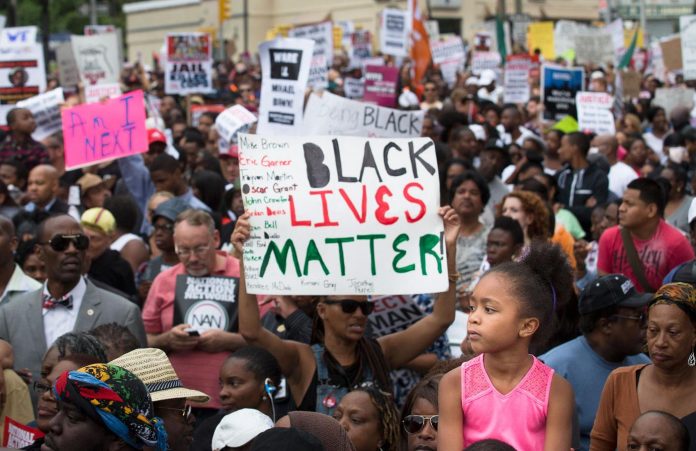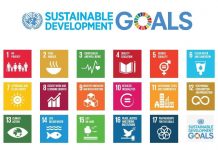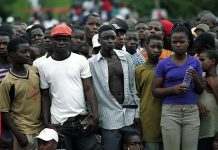In July 2006, the European news agency Agence France Presse reported that 13 of 27 Africans, all men between the ages of 20 and 30, had perished in the Mediterranean Sea while trying to reach Europe in hopes of finding a better and safer existence than the one they had left behind. Another 17 bodies had been found in March the same year, just south of the Canary Islands. And just before that, the bodies of 47 Senegalese were found on a boat adrift near the Caribbean island of Barbados, four months after they had left Cape Verde for the Canary Islands.
African migrant deaths at sea, at first reported in the tens, are now counted in the thousands. From the beginning of 2015 through May, an estimated 60,000 migrants have braved “the sea in the middle of the Earth” to reach Europe. More than 1,800 have died on the journey, a figure more than 30 times higher than during the same period of 2014, according to the International Organization for Migration.
In all of 2014, some 3,500 people died at sea in a bid to reach a Europe that does not want them. And while the bodies recovered in decrepit boats once were those of young men only, those recovered today tell the tale of desperate young men and women taking the ultimate risk; of parents who pay smugglers upwards of $6,000 for their children to flee an Africa that offers them little by way of a future.
“There are no opportunities. If I don’t go, I’m stuck here with nothing to do and I don’t want to be a burden to my family,” Al Jazeera quotes one Ethiopian as saying.
A mass grave is being created in the Mediterranean Sea, declares Loris De Filippi, president of the international aid group Doctors Without Borders. Widespread poverty and massive youth unemployment are to blame, says Amsatou Sow Sidibe, an adviser to Senegalese President Macky Sall. Yet, in all this time, in all these years of reports of their men, women, and children dying at sea or at the hands of traffickers before they even reach the sea, African heads of states have been mute.
Gambian President Yahya Jammeh possibly is the only African head of state to say something. Rather than look inward, however, he blamed the migrant crisis on “the very dangerous, racist and inhuman behavior of deliberately causing boats carrying black Africans to sink,” and on parents who are not “true Muslims” for not believing “that their sons and daughters could have made it at home if they were ready to invest and work.”
Who would have thought that, at the time when it is being lauded as a lion on the move, a reformed continent that houses the world’s the fastest growing economies, a hotbed of entrepreneurship, technological innovation and investment opportunity — Africa would be in need of a “Black Lives Matter” movement. At stake are the energy, productivity and innovation embedded in a generation that gives the continent its economic legs.
#Black Lives Matter was created in the United States in 2012 after Trayvon Martin, a Black Florida teenager walking home with candy and soda he had just bought, was murdered by a white neighborhood vigilante. The vigilante, George Zimmerman, was acquitted of his crime.
The movement has since blossomed following multiple killings of unarmed Black men by police officers nationwide. A statement on its website says, “When we say ‘Black Lives Matter,’ we are broadening the conversation around state violence to include all of the ways in which Black people are intentionally left powerless at the hands of the state. We are talking about the ways in which Black lives are deprived of our basic human rights and dignity.”
At a meeting in the Gambian capital of Banjul in May, the African Commission on Human and People’s Rights denounced the silence of African countries and called on the African Union “to end this scourge, and respond to the plight of these people.”
Ousainou Darboe, a rights activist, politician and lawyer in Banjul, described what a routine that is well known. “Every Wednesday and Friday, you have our youths boarding buses here in Banjul to go to Mali, their first point of call for the journey. From there they go to Libya where they board unworthy sea vessels and in the process the boats capsize and some will die,” he told Agence France Presse.
At least one African state, Ethiopia, is taking steps to stem the perilous exodus, setting up several vocational workshops to empower young people and providing low-interest loans to youth and women groups with good business ideas. It’s slow going, but a promising start.
Rosalind McLymont is the CEO and publisher of AfricaStrictlyBusiness.com. The above commentary first appeared in the “Africa FOcus” column of the Summer 2015 edition of The Network Journal.













